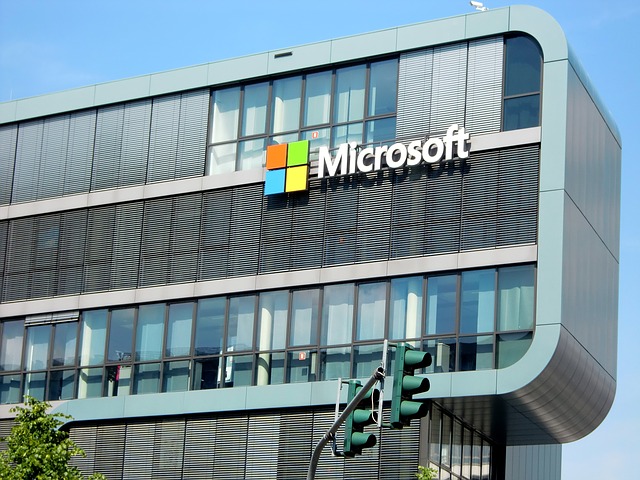Cloud Stocks: Analysis Of Microsoft’s Acquisition Of Nuance

Earlier last week, Microsoft (Nasdaq: MSFT) announced its third-quarter results that continued to outpace market expectations. Last month, Microsoft announced another big acquisition, this time within the Healthcare segment, to expand its presence in a $500 billion market.
Microsoft’s Financials
Microsoft’s revenues grew 15% to $41.71 billion, significantly ahead of the market’s forecast of $41.03 billion. Net income was $14.8 billion, or $1.95 per share, which was also ahead of the Street’s forecast of $1.78 per share.
Revenues from the Intelligent Cloud segment that includes Azure grew 23% to $15.12 billion. The market was looking for revenues of $14.92 billion from the segment. Azure sales fell 4% over the year. Revenue from Productivity & Business Solutions include cloud software assets such as LinkedIn grew 15.4% to $13.56 billion, again ahead of the analyst predictions of $13.49 billion. More Personal Computing that includes Windows, Xbox, and Surface revenues grew from $11 billion last year to $13.04 billion, ahead of the Street’s forecast of $12.55 billion.
It was a stellar quarter for Microsoft. It reported a growth of 39% in Commercial bookings, which is the highest ever in the last five years. Azure continues to grow and it became the leader in cloud data warehouse, followed by AWS and Snowflake. It continued to expand its developer presence globally. It reported 25 million Visual Studio monthly active users, with 65 million developers using GitHub. Monthly active users of Power Platform grew 97% to 16 million. Driven by continued investment in gaming content, Xbox subscriber base grew to 18 million.
For the current quarter, Microsoft forecast revenues of $43.6-$44.5 billion, compared with the market’s forecast of revenues of $42.98 billion.
Microsoft’s Nuance Acquisition
Earlier this month, Microsoft announced its $19.7 billion acquisition of Massachusetts-based Nuance Communications. Founded in 1992 by Ronald Croen, Nuance provides solutions to amplify human intelligence, increasing productivity and security, creating stronger relationships and better experiences for customers and the workforce. Nuance specializes in voice recognition, artificial intelligence, and is known for originally building the backend for Siri. It focuses especially within the healthcare segment and helps doctors speed up documentation, predict a patient’s needs, and improve digital record-keeping at hospitals.
The acquisition builds on a partnership that was announced between the two companies in 2019 when they were working together to offer healthcare collaboration tools. Its earlier partnership was focused on improving interactions with patients using ambient clinical intelligence (ACI), a technology that uses sensors and conversational AI to automate administrative tasks and documentation. Last year, the two companies had announced the integration of Nuance’s ACI technology with Microsoft’s collaboration solution Teams to bring those benefits to remote and virtual consultations.
The acquisition is expected to expand Microsoft’s Healthcare Initiative, which is estimates to be a $500 billion addressable market opportunity. It will allow Microsoft to empower healthcare workers better with ambient clinical intelligence. Microsoft is hopeful that Nuance’s conversational AI capabilities coupled with its own global footprint and cloud infrastructure will help it expand rapidly within the healthcare segment. Additionally, it is probably looking at leveraging Nuance’s conversational and AI capabilities to build a rival for Amazon’s Alexa or Apple’s Siri.
Recently, there has been a significant push from big tech to enter the $3.6 trillion healthcare industry. Amazon is making inroads in the industry with the proposed launch of Amazon Pharmacy in November, which will be able to send most US customers their prescription medicine with no delivery fee. News reports also suggest that Amazon is looking at ways to connect workers with primary care specialists for both in-person and online visits through a program called Amazon Care. Apple’s biggest health-focused initiative has been the continued investment and improvement of its Watch that can measure useful metrics to assess the wearer’s health condition. Google is not far behind with its $2.1 billion acquisition of Fitbit earlier this year.
Last year, Microsoft itself had launched its Healthcare initiative with the release of a Cloud service dedicated to the vertical that allowed healthcare professionals to schedule and conduct virtual patient visits within Microsoft Teams, and monitor patients’ medical devices remotely through Azure. This latest acquisition will surely help Microsoft make its presence felt within the industry.
Its stock is trading at $247.79 with a market capitalization of $1.86 trillion. It hit a 52-week high of $263.19 in April this year and a 52-week low of $175.68 in May last year.
Disclosure: All investors should make their own assessments based on their own research, informed interpretations and risk appetite. This article expresses my own opinions based on my own ...
more



With microsopht getting into health care we can all anticipate paying higer prices for lower quality and having weekly corrections made if we want them or not. We can also expect new versions periodically with no regard to anything or anybodies needs.